- Home
- entertainment
- news
- Billie Eilish's 'Happier Than Ever' doesn't live up to the brilliance of its title track
Billie Eilish's 'Happier Than Ever' doesn't live up to the brilliance of its title track
Callie Ahlgrim,Courteney Larocca

- Billie Eilish released her 16-track sophomore album, "Happier Than Ever," on Friday.
- It has some spectacular songs - especially the title track - but lacks a cohesive allure.
- The best songs are "Billie Bossa Nova," "Oxytocin," "Halley's Comet," "Happier Than Ever," and "Male Fantasy."
Billie Eilish released her highly anticipated sophomore album, "Happier Than Ever," on Friday.
The 16-song collection was created during quarantine alongside Eilish's brother, producer, and cowriter, Finneas O'Connell - continuing the insular process of her 2019 debut, which brought the duo staggering chart success and critical acclaim.
Insider's music team (reporter Callie Ahlgrim and celebrity and music editor Courteney Larocca) listened to the new album on our own, jotting down our initial thoughts track by track.
Here is what we thought of each song on "Happier Than Ever" upon first listen. (Skip to the end to see the only songs worth listening to and the album's final score.)
"Getting Older" sets the scene with mellow production and candid lyrics.
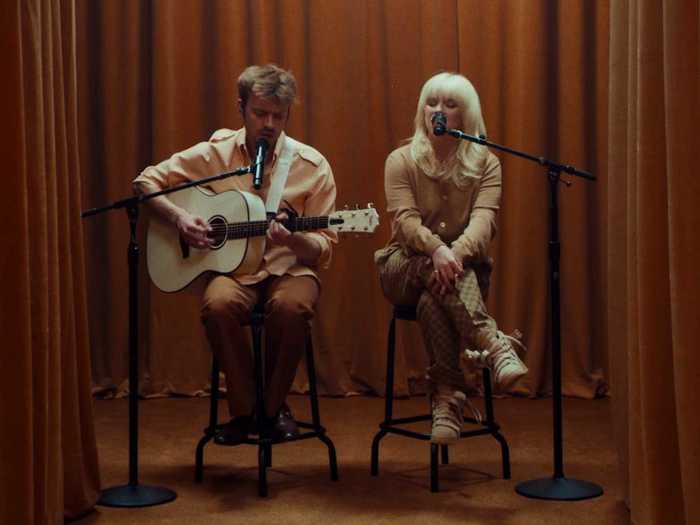
Ahlgrim: This isn't at all what I expected from Eilish's opening track. Its production is lean, light, and far warmer than its lyrics would suggest. The chorus kicks off with a devastating couplet, delivered with a Disney-esque melody: "Things I once enjoyed / Just keep me employed now." Eilish sings of abuse and trauma in her trademark flutter.
I am weirdly reminded of Snow White picking flowers in the forest. It's an idyllic scene, a classic image of innocence and beauty — until you remember that someone is coming to slice her heart out.
Larocca: On "Getting Older," Eilish promises to open up emotionally on "Happier Than Ever." She even hints at certain vulnerabilities ("Last week, I realized I crave pity / When I retell a story, I make everything sound worse").
But she doesn't fully commit here. In effect, "Getting Older" is little more than a drawn-out prologue.
If Eilish were a random artist I hit play on for the first time, I wouldn't stick around to see what else "Happier Than Ever" has to offer based on this opening track alone. The nice thing about being a mega-popular musical wunderkind is that most people will give you the benefit of the doubt and soldier on with your album even after a lackluster start.
"I Didn't Change My Number" will intrigue some and instantly alienate others.

Ahlgrim: "I Didn't Change My Number" opens with animalistic growling — perhaps a cameo from Eilish's beloved pit bull, Shark, whom she adopted during quarantine. The clamor is curbed by Eilish herself, whose brusque "OK" is inexplicably hot. It's the heir apparent of the iconic "Duh" on "Bad Guy."
That opening detail doesn't disappear completely, however. O'Connell weaves a scrap of the sample into the song's beat, ingeniously transforming the snarl into a snare.
As the song winds down, another feral effect arrives, sounding like a robot rattlesnake that's trying to intimidate its prey.
These outré flourishes complement the song's theme: "I didn't change my number / I only changed who I reply to." Eilish is following her instincts now. What does a traumatized superstar care if you think she's "mean?"
Larocca: I appreciate Eilish and O'Connell's affinity for sourcing household noises to add texture and intrigue; I previously noted Eilish's dad sharpening a knife as a highlight on "You Should See Me in a Crown."
That said, no matter how many times I hear "I Didn't Change My Number," my face involuntarily winces at the sound of Eilish's dog snarling into my ear.
The rest of my opinion on this song can be summed up with its very first word, delivered with the same blasé tone as Eilish's own: OK.
"Billie Bossa Nova" is a bright, jazzy number with a gorgeous vocal performance.
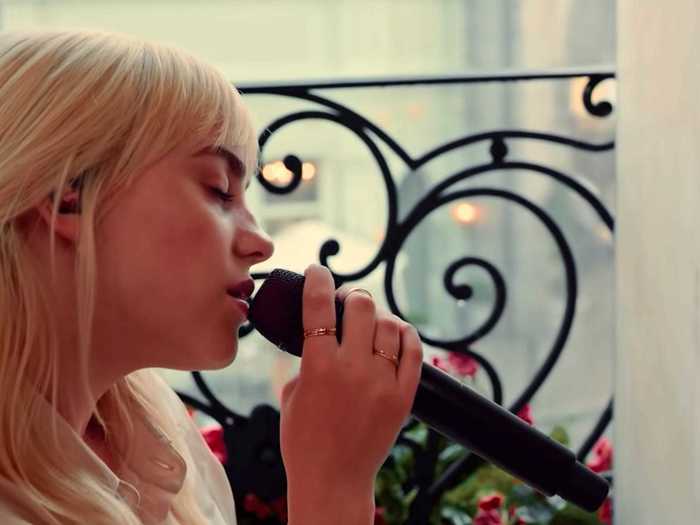
Ahlgrim: Eilish's voice is perfect for this samba-inspired landscape, especially now that she's learned to enunciate (better than she has in the past, at least). I especially love the way she delivers the pre-chorus, like she's tiptoeing across a starry sky ("I'm not sentimental / But there's somethin' 'bout the way you look tonight").
I know this is oddly specific, but this song makes me think of a warm summer night in Paris through the eyes of Vincent Van Gogh. The colors are swirling together and everything looks a bit more romantic than should be.
Eilish's experience as a celebrity is unusual, so "Billie Bossa Nova" could've sounded lofty and out of touch. Instead, her lyrics describe a specific strangeness ("Use different names at hotel check-ins / It's hard to stop it once it starts") while evoking the relatable allure of sneaking around, seduction behind closed doors; that tingly swoop in your stomach when you lock eyes with a secret lover.
Larocca: "Love when it comes without a warning / 'Cause waiting for it gets so boring / A lot can change in 20 seconds," is a coincidentally spot-on introduction to the album's first bright spot, considering it's preceded by two of the dimmest.
Eilish is spellbinding on the mature "Billie Bossa Nova." She invites you into her hotel-room hideout, demanding all of your attention ("You better lock your phone / And look at me when you're alone.")
A whispered chant of "I'm not sentimental" plays out the song; one final incantation to leave you charmed.
"My Future" has lost some of its luster over time.

Ahlgrim: I'm surprised Eilish included "My Future" on "Happier Than Ever," since it was released one whole year ago.
I do love this song, though I wonder if it would've made more sense as a standalone single. The jazzy, vintage tones fit into this tracklist nicely — especially coming after "Billie Bossa Nova" — but the song's theme feels transitional. I don't see this as a lead sophomore single, but as a farewell to Eilish's debut era.
Hearing it right now leaves me slightly more perplexed than awestruck.
Larocca: When "My Future" came out, my initial thoughts were that it's sweet, but the first half of the song is about 45 seconds longer than it deserves to be.
Now, within the confines of the album, the intro not only overstays its welcome, but the song as a whole loses its novelty completely. "Goldwing," "Halley's Comet," and "Happier Than Ever" all adopt this two-part structure to greater effect, making "My Future" seem novice by comparison.
This one would have been better utilized as a bridge between eras. Instead, including it on this tracklist only serves to hold Eilish back.
"Oxytocin" is chaotic good.
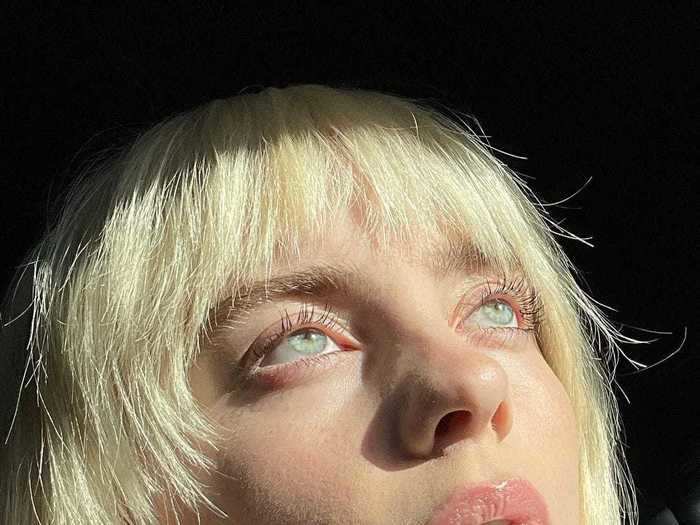
Ahlgrim: Within the first 10 seconds of this song, I jotted this down in my Notes app: "Nelly Furtado!! Timbaland!!!!!"
Indeed, "Oxytocin" begins with the beat of an early-aughts banger — but quickly shapeshifts into throbbing electropop, à la Charli XCX or Sofi Tukker. It conjures the image of a neon-lit club with Eilish in the center, powerful and magnetic, consuming all the energy in the room like a supermassive black hole.
This is the most adventurous O'Connell has ever gotten with his sister's production and that's saying a lot, given the duo's history of hijacking dental drills and crosswalk warnings.
Larocca: This song is hot. It has breathy vocals, a thumping beat, a moment when everything fades to silence for a split second before the production kicks into overdrive. There's a very explicit visual of loosening a collar. It has the line "And what would people say, people say, people say / If they listen through the wall, the wall, the wall?"
I know I wasn't kind to a few of the earlier songs, but we need "Happier Than Ever" for the "Oxytocin." You should really run and hit play on this one.
The premise of "Goldwing" is ambitious, but ultimately feels vague and unsatisfying.
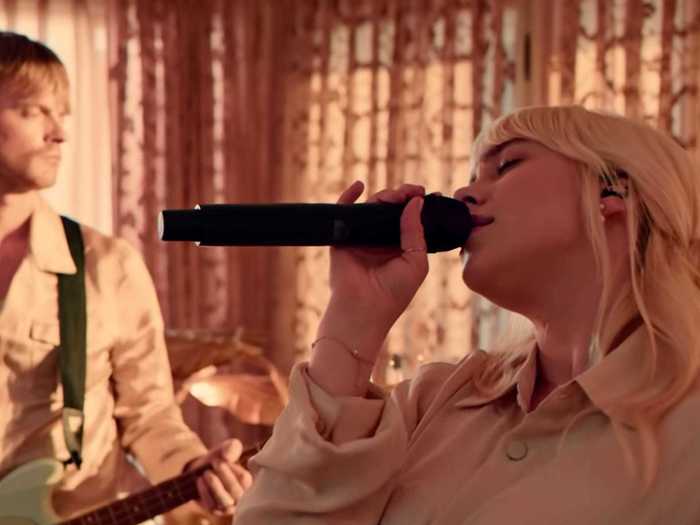
Ahlgrim: The first half of "Goldwing" is standard "background music." It's giving me church choir, it's giving divine intervention, it's giving "Raindrops" by Ariana Grande. The effect is pretty, but it lacks a strong vision.
The mid-song transition does what it can to salvage momentum, and the second half is quite funky. I appreciate the creative risk taken here.
Nevertheless, "Goldwing" feels too much like two unfinished songs stitched together. Neither half truly delivers.
Larocca: The first 50 seconds of "Goldwing" are hymn-like, putting Eilish's angelic voice to great use.
The repetition of the title transitions the song into its second part, quickly interweaving itself into the backing instrumentals. This adds a fascinating dimension to this half of the track, but once it cuts out just shy of the two-minute mark, my interest does too.
"Lost Cause" is a delicious breakup bop.
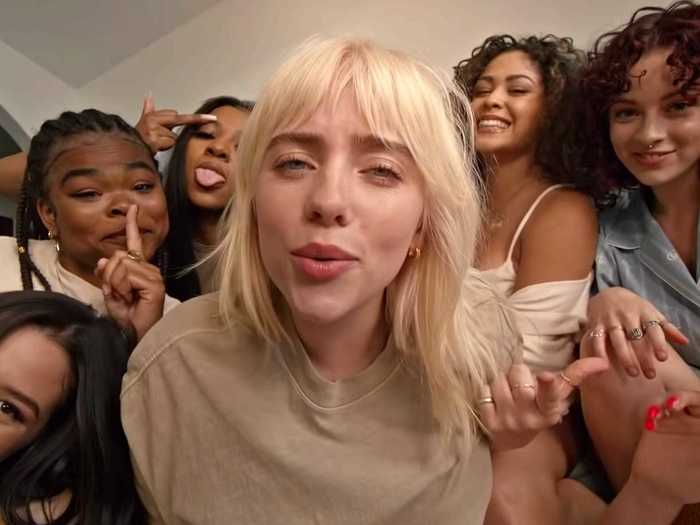
Ahlgrim: "Lost Cause" is easily my second-favorite single from this album, second only to "Therefore I Am." It took a few listens to take root, but once it did, I had no hope of digging it out. It has since been added to my "songs that are laced with something" playlist.
"Lost Cause" is a sneaky kind of hit, draping youthful scorn in old-Hollywood glamour. Eilish's takedowns are both elegant and withering in their simplicity: "I used to think you were shy / But maybe you just had nothing on your mind." If someone said that to me, I'd implode on the spot.
Larocca: On the surface, "Lost Cause" is a scathing breakup song targeting a deadbeat ex with zero motivation. Eilish spends a decent chunk of the track dragging this man with snide observations like "Someone like you would always be so easy to find" and "Maybe you were thinkin' 'bout yourself all the time."
But Eilish adds depth when she does something her ex was incapable of: she introspects.
In the pre-chorus, Eilish quips, "I sent you flowers / Did you even care?" She later flips the line to "Gave me no flowers / Wish I didn't care," revealing that she's still hung up on this person, even though she recognizes they didn't reciprocate the same care she gave them.
She even admits she knew during the relationship that her partner needed to work on themselves, and foolishly believed they would: "Thought you would've grown eventually, but you proved me wrong."
It's this inward reflection coloring the outward blame that makes "Lost Cause" so satisfying. We know the narrator has put in the work that the subject hasn't, which means we can scream along to "But you got no job!" knowing she isn't punching down here. (And, even if she is, it feels justified.)
"Halley's Comet" boasts some of Eilish's best lyrics to date.
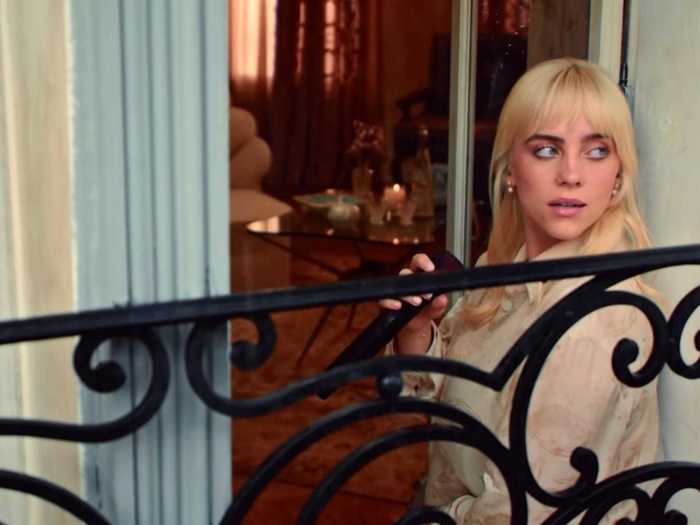
Ahlgrim: This is reminiscent of "I Love You," which is arguably the most timeless song on Eilish's debut. "Halley's Comet" shares that transcendence, that lack of fear and constraint; it's emotion in its purest form.
Right off the bat, the opening line creates an exquisite tension. "I don't want it," Eilish insists. But the rest of the song aches and sighs, exposing Eilish's casual resignation: "What a drag to love you like I do."
At two minutes and 30 seconds, I am already itching to start the whole song over to absorb these lyrics more fully.
Then comes the outro, which has the impact of buttercream icing on your favorite flavor of cake — except this treat was made by Willy Wonka and it's designed to make you hallucinate. The song's final minute revists the concept of a dreamscape, with all the surreal honesty Eilish promised you'll find there.
Larocca: Each piano note on "Halley's Comet" twinkles like a shooting star, gently illuminating a nighttime sky. In this metaphor, then, Eilish's voice is the Milky Way, softly swirling and connecting every note to the next with delightful ease.
It's as if the cosmos aligned only so Eilish's warm lilt could be married with the rest of this intimate soundscape. An assessment she'd likely agree with, as she murmurs on the fourth verse: "I've been loved before, but right now, in this moment / I feel more and more like I was madе for you."
"Not My Responsibility" is a spoken-word interlude that wasn't necessary to include.
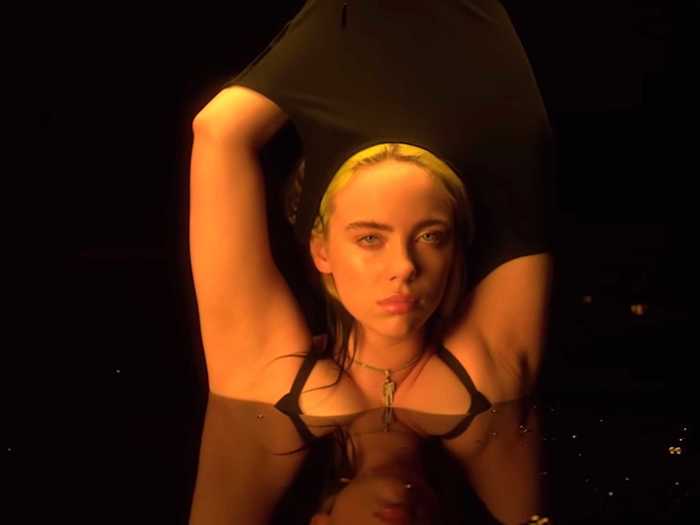
Ahlgrim: The vast majority of Eilish's fans have heard this one before. It's the same audio from her short film of the same name, released online in 2020 after the pandemic postponed her world tour.
Originally, "Not My Responsibility" was conceived as an interlude for Eilish's live show, paired with a clip of her stripping down and sinking into black sludge. It worked extremely well in that context. Eilish's image has been dissected and debated with barbaric persistence, and she deserves to expose that sport for the sexist drivel it is.
I especially appreciate the line, "The body I was born with — is it not what you wanted?" Doesn't that just put the modern concept of beauty into perspective? The absurdity of trying to please other people's physical preferences? That's not what bodies are for!
All that said, this interlude didn't need to be here. "Not My Responsibility" has been public domain for over a year, and without the accompanying visual, the speech loses some of its impact. It also disrupts the momentum of this tracklist.
Larocca: "Not My Responsibility" was brilliant as a short film on the Where Do We Go? World Tour. But it doesn't work on Eilish's sophomore album.
To set the scene of why this three-minute-and-47-second spoken-word interlude has no right being here, envision a party. Spotify is on shuffle, flicking through various top-40 hits. Suddenly this comes on, and a room full of people is now being preached at by a 19-year-old with a basic understanding of feminism.
Sure, a party isn't the only notable place where music plays, but come on. Anyone listening to Eilish's album in full likely already knows her thoughts on body shaming and incessant criticism over her clothing choices. It's been well documented.
Is there value in using your platform to raise awareness about the heinous ways misogyny impacts young women in their daily lives? Of course, but that's why this worked so well on tour. Showing a short film in the middle of your live show is an effective way of taking advantage of an already engaged audience.
But slapping it haphazardly onto an official tracklist only evokes an eye-roll and a guarantee of pressing skip.
"OverHeated" seems to explore Eilish's relationship with paparazzi and the internet.
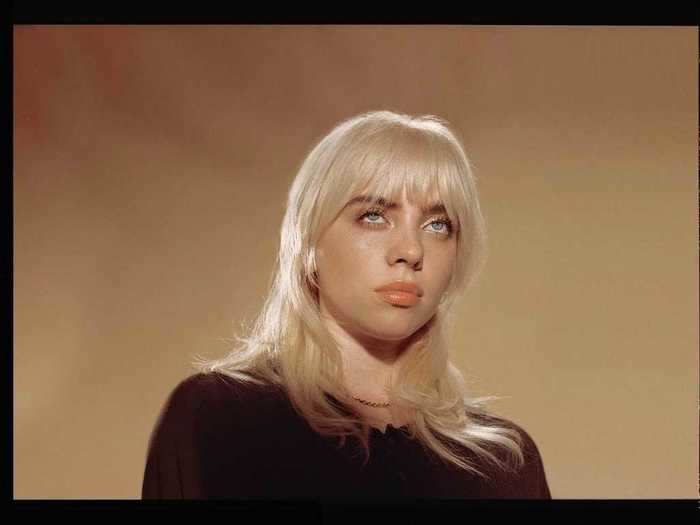
Ahlgrim: I need to take a moment to applaud the transitions on this album. "Not My Responsibility" bleeds into "OverHeated" so seamlessly, I'm briefly surprised they're not two halves of the same song.
Eilish and O'Connell have always done this well — think "Bury a Friend" and "Ilomilo" — but it's more polished and intentional here, which creates a stunning cinematic effect.
"OverHeated" grapples with the real-life implications of its predecessor, presenting a more vulnerable reaction to Eilish's neverending spotlight ("Is it news? News to who? That I really looked just like the rest of you"). I feel like I'm watching the main character of an HBO show go through a feminist awakening, then a drunken doom-spiral later that night. Hello, it's called college.
Larocca: The beat of "OverHeated" was made from the production of "Not My Responsibility," only solidifying my stance that the latter song didn't need a coveted tracklist placement.
Similar to the spoken-word interlude it pulled its sound from, "OverHeated" sees Eilish calling out body shamers for insinuating the one she was born into isn't good enough: "And everybody said it was a letdown / I was only built like everybody else now / But I didn't get a surgery to help out / 'Cause I'm not about to redesign myself now, am I?"
But while there's more finesse and musicality to the way Eilish addresses her critics here, the song runs a touch too long, thanks to a 38-second instrumental outro and an almost-ironically repetitive chorus (Can't be repeated? Are you sure about that, Billie?)
"Everybody Dies" is too spacey to be interesting.

Ahlgrim: This sounds like the sensitive little sister of "No Time to Die," except it lacks the tension and release of a James Bond melodrama.
"Everybody Dies" is ambient in a way that doesn't quite inspire me, although this line was just sharp enough to cut through the haze: "It's just a lot to think about the world I'm used to / The one I can't get back, at least not for a while / I sure have a knack for seeing life more like a child."
Larocca: "Everybody Dies" is instantly forgettable. Every time I listened to it to form a concrete thought to put down here, "Your Power" would start playing and I'd realize I just dissociated for three-and-a-half minutes.
This song fails to make any lasting impression whatsoever.
"Your Power" is a haunting story in a folksy ballad.
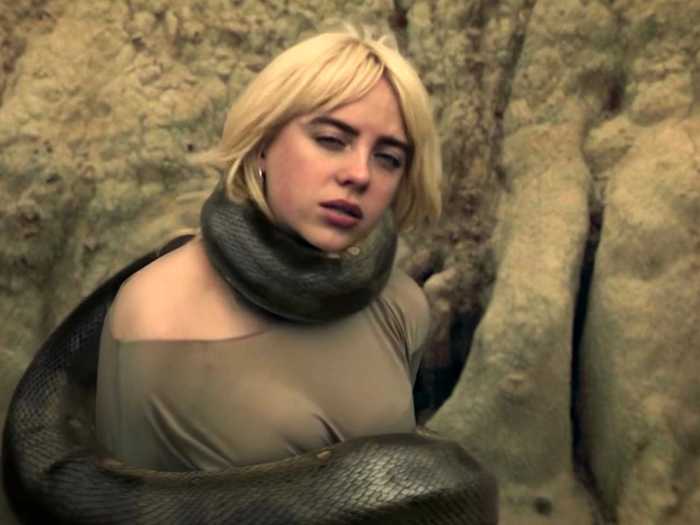
Ahlgrim: I appreciate this song so much more within the context of this tracklist (I just caught the siren sound buried in the first verse. Genius). I understand that singles tend to get more attention, but I wish "Your Power" had been quietly reserved for this moment, primed to wreak havoc on unsuspecting travelers.
Luckily, this is the kind of song that will outlive its release strategy, its rumored muse, and perhaps Eilish's own reputation. Compared to the intimate danger she describes, it hardly matters what strangers think of her. At 19 years old, she has already seen too much. She has already learned to expect threats around every corner, even the ones that seem bright and edgeless.
The song itself mirrors that experience. Its rustic guitar and gleaming vocals belie the darkness within. The juxtaposition is chilling, particularly when Eilish's shield is lowered slightly. Her caustic delivery of "How dare you?" gives me goosebumps.
Larocca: "Your Power" reminds me of another pop star's acoustic-guitar-backed ballad about being preyed upon by an older man as a teenager: Taylor Swift's "Dear John." But where Swift delves into specifics, Eilish tries to keep her experience vague.
"Does it keep you in control? (In control) / For you to keep her in a cage? / And you swear you didn't know (Didn't know) / You said you thought she was your age" is just another devastating way of asking "Don't you think 19 is too young / To be played by your dark twisted games, when I loved you so?"
But this single isn't made any less powerful just because the concept has been explored before. Actually, the comparison of "Your Power" to a song that came out 11 years ago serves as a painful reminder that predatory men are still abusing their power over young girls.
"NDA" doesn't stand out like it should.
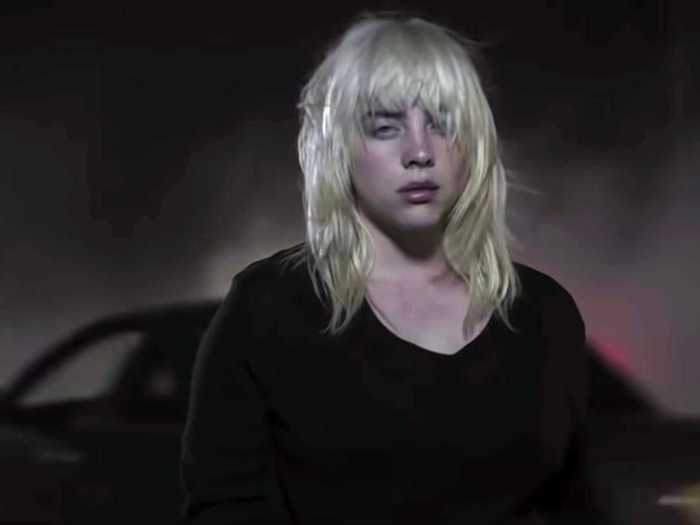
Ahlgrim: I want to like this song more than I actually do. "NDA" has all the trappings of a Billie Eilish hit; I'm particularly fond of the spooky guitar plucks in the pre-chorus, which sound like something you'd hear in a fantasy-horror movie from Studio Ghibli.
But for some reason, "NDA" isn't sticky. While I've consistently enjoyed the listening experience, I'm not terribly sad when it's over.
I also think it was a mistake to sandwich "NDA" between two other singles, both of which I prefer. If you're going to prerelease a sizable chunk of your album, you better make sure it doesn't sound like well-worn terrain, or an obstacle on the way to shinier toys.
Larocca: Songs complaining about being rich and famous are rarely engaging, and this one surely isn't — especially since it's far from the lone fame-centric narrative on this album.
I do respect how she interweaves references to other tracks in the second verse: "I've been having fun, getting older now / Didn't change my number, made him shut his mouth (his mouth) / At least I gave him something he can cry about / I thought about my future but I want it now."
But it's going to take more than a glimpse of wit to overlook a member of the 1% crying about how she's going to use her millions to disappear to Hawaii.
To make matters worse, Eilish sounds dispassionate throughout, prohibiting the song from exhibiting any real emotional pull.
"Therefore I Am" is Eilish at her most charismatic.
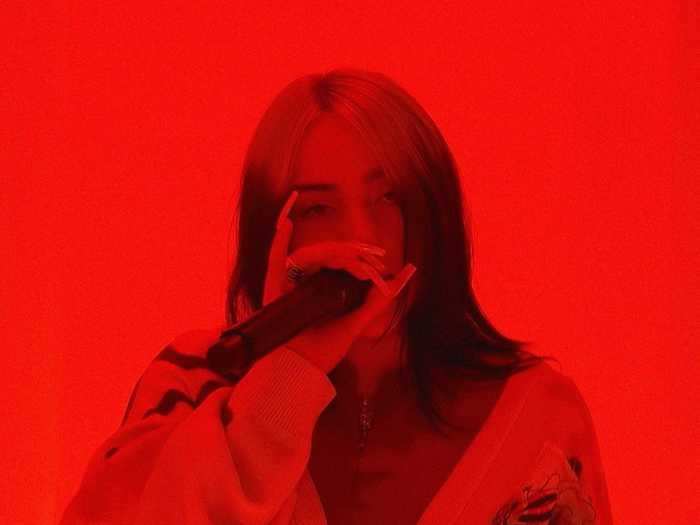
Ahlgrim: I'm on the record as a "Therefore I Am" stan and I'm delighted to say it still slaps.
This is perhaps the most quintessential "Billie Eilish" song in her entire catalog. It's packed with all the charm, humor, and finesse you'd expect. Who else could have me head-banging to a philosophical concept from 1637?
Larocca: We've had "Therefore I Am" for nearly nine months now, and I'm still not tired of it.
In fact, Eilish's "articles, articles, articles" rattles around in my brain on a weekly basis — though that might only be because I'm a member of the press. Not sure if that's a universal experience for people in other occupations.
I've seen enough TikTok videos though to know I'm not alone in enjoying the way she smirks her way through the line, "Stop, what the hell are you talking about?"
Eilish injects so much personality into "Therefore I Am" that it'd be hard not to like it.
"Happier Than Ever" is the best song on the album - maybe Eilish's best song to date.

Ahlgrim: I'm not trying to be dramatic, but listening to "Happier Than Ever" gave me one of the greatest music-induced thrills I've ever known.
Here is what I wrote in my Notes app during the second chorus: "I've been excited for this song since I saw 'The World's a Little Blurry,' which shows Billie and Finneas writing the chorus. The studio version did not disappoint. I'm glad they didn't change it too much. I feel like I'm sad at a luau."
Had it ended there, "Happier Than Ever" still would've been one of my favorite songs on the album. But at the 2:18 mark, actual magic happened: The strums became electric; Eilish's voice adopted a grainy tone I'd never heard before; my jaw fell open, literally.
Here is what I texted Courteney once the song had ended: "I DONT RELATE TO U CAUSE I'D NEVER TREAT ME THIS S---TY!! U MADE ME HAAATE THIS CIITYYY!!!!!!!"
It's rare that a song hits me this hard during a first-listen. I feel like the previous 14 tracks were all appetizers, building up to those harmonic screams.
Larocca: With lines like "When I'm away from you / I'm happier than ever" and "You clearly werеn't aware that you made me misеrable," the chorus and first verse of "Happier Than Ever" flicker shyly with anger, like kindling catching fire.
But the real thrill comes when Eilish douses it all with gasoline.
Every ounce of rage burns brighter than the last, fueled entirely by her ex's mountain of faults; "You scared me to death, but I'm wastin' my breath / 'Cause you only listen to your f---in' friends" seems constrained when immediately followed by "I don't relate to you, no / 'Cause I'd never treat me this s---ty / You made me hate this city."
With "Happier Than Ever," Eilish gives us the rawest display of emotion we've ever heard from her, and the best song of her career thus far.
"Male Fantasy" is a tender meditation on expectation versus reality.

Ahlgrim: I won't lie, I'm a little underwhelmed by "Male Fantasy" after the unfettered high of "Happier Than Ever." The penultimate track would've been one hell of a closer.
However, I also understand "Male Fantasy" as the sober comedown after heartbroken rage — all the quiet, lonely things you do in the aftermath. Knowing you're better off without someone and actually being over someone are two very different things. Eilish explores that frustration with vivid candor.
Larocca: Eilish revealed on Spotify that "this is exactly how I wanted the album to end," adding that she believes "nothing should end on an angry note." I understand where she's coming from, but she does "Male Fantasy" a disservice by placing it after "Happier Than Ever."
"Happier Than Ever" is multi-faceted and cathartic; it's the only release on an album full of restraint. By choosing not to finish on it, Eilish effectively renders the song that follows a throwaway bonus track. She denies you the opportunity to fully immerse yourself in "Male Fantasy," which is a shame because it's one of the album's better moments.
Eilish navigates the complicated terrain of her own emotions post-breakup, questioning if she's moving on from her ex, or "just pretending to." The genius of the song is that it doesn't matter either way — both are male fantasies.
As Margaret Atwood famously wrote in "The Robber Bride," it's a male fantasy to be "strong enough to take what they dish out, or else too weak to do anything about it. Even pretending you aren't catering to male fantasies is a male fantasy: pretending you're unseen, pretending you have a life of your own, that you can wash your feet and comb your hair unconscious of the ever-present watcher peering through the keyhole."
When Eilish sings about distracting herself with pornography, she shares the experience of watching a male fantasy play out while playing one out herself, simply by being a woman watching porn.
She never escapes from these fantasies even as she pivots away from the obvious ones. She puts on a front to appear detached, but in the final moments admits she still "can't get over you / No matter what I do."
To put it plainly, here's the first note I wrote down about this song: "It's a man's fantasy to have a girl singing about how much she loves his unworthy ass."
Final Grade: 7.2/10

Ahlgrim: As a music critic, I know I'm meant to judge an album holistically. But all I have is my truth, and right now, my love for the title track has superseded all other impressions.
I have listened to "Happier Than Ever," the album, once. I have listened to "Happier Than Ever," the song, 18 times. I feel like it's the moon and my brain is the sun and there's a solar eclipse.
Thus is the pleasure and challenge of a first-listen review: It requires immediate honesty, which perhaps requires some oversimplification. I'm eager to see how the rest of these songs grow on me over time, like "Your Power" and "Lost Cause" surely have. I can already tell that "Oxytocin" and "Halley's Comet" will enjoy prominent spots on my Spotify Wrapped come December.
But I also believe that truly great albums — most, if not all — reward immediate honesty. They tend to demand your attention from the jump, even if you can't explain why you love it yet. You just know you will.
Obviously, this isn't an exact science. But for me, Eilish's sophomore album lacks that seductive mystique. I know it's objectively good, yet I'm not itching for another whirl. More likely, I will harvest the juiciest crops for my favorite playlists and leave the rest to dry.
Larocca: "Happier Than Ever" promises to deliver on real vulnerability, but never quite gets there.
Far too often, Eilish tells you she's upset or has trauma to unpack, without ever showing what those experiences look like. It's frustrating, considering the best songs ("Happier Than Ever," "Oxytocin," "Halley's Comet") are the ones where she gives into the emotion she's trying to express (rage, horniness, love).
That's not to say the rest of the album is bad — there's nothing on "Happier Than Ever" that's greatly offensive to my ears. But without tactile imagery or vocal variety, songs like "NDA" and "Everybody Dies" only contribute neutrality.
Unfortunately, about half of this album is made up of anodyne moments, making for a mostly bland listening experience. It's disappointing, because on the very same tracklist, Eilish proved she can wield her power to enchant listeners and spark a fire within.
I came away from this album feeling fine. But I wanted to come away feeling happier than ever — or sadder than ever, or madder than ever. I wish Eilish had given us more to feel.
Worth listening to:
"Billie Bossa Nova"
"Oxytocin"
"Lost Cause"
"Halley's Comet"
"Overheated"
"Your Power"
"Therefore I Am"
"Happier Than Ever"
"Male Fantasy"
Background music:
"Getting Older"
"My Future"
"Goldwing"
Split decision:
"I Didn't Change My Number"
"NDA"
Press skip:
"Not My Responsibility"
"Everybody Dies"
*Final album score based on songs per category (1 point for "Worth listening to," .5 for "Background music," .5 for "Split decision," 0 for "Press skip").
READ MORE ARTICLES ON
Popular Right Now
Popular Keywords
Advertisement